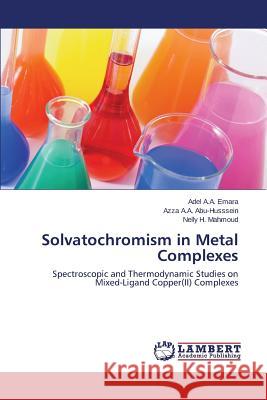Solvatochromism in Metal Complexes » książka
Solvatochromism in Metal Complexes
ISBN-13: 9783659517365 / Angielski / Miękka / 2014 / 200 str.
This book provides an overview in recent progress in the field of solvatochromism in new mixed-ligand copper(II) complexes containing the bidentate di-nitrogen ligands and bidentate di-oxygen ligands. Copper(II) complexes were prepared and characterized by elemental analysis, infrared, mass and ESR spectral data, magnetic and molar conductance measurements and thermal gravimetric analysis. From the investigation, the geometries of the complexes are square planar for perchlorate complexes, square pyramid or octahedral for the nitrate complexes and octahedral for the bromide complexes. Thermal and kinetic parameters for the nitrate complexes are investigated. The kinetic parameters (E, A, ΔG, ΔH, ΔS) of all thermal decomposition stages were calculated using the Coats-Redfern and other standard equations. Solvatochromic behavior of some copper(II) complexes indicates strong solvatochromism of their solutions in polar and non-polar solvents. The observed solvatochromism is due to the solute-solvent interaction between the chelate cation and the solvent molecules.
This book provides an overview in recent progress in the field of solvatochromism in new mixed-ligand copper(II) complexes containing the bidentate di-nitrogen ligands and bidentate di-oxygen ligands. Copper(II) complexes were prepared and characterized by elemental analysis, infrared, mass and ESR spectral data, magnetic and molar conductance measurements and thermal gravimetric analysis. From the investigation, the geometries of the complexes are square planar for perchlorate complexes, square pyramid or octahedral for the nitrate complexes and octahedral for the bromide complexes. Thermal and kinetic parameters for the nitrate complexes are investigated. The kinetic parameters (E, A, ΔG, ΔH, ΔS) of all thermal decomposition stages were calculated using the Coats-Redfern and other standard equations. Solvatochromic behavior of some copper(II) complexes indicates strong solvatochromism of their solutions in polar and non-polar solvents. The observed solvatochromism is due to the solute-solvent interaction between the chelate cation and the solvent molecules.











